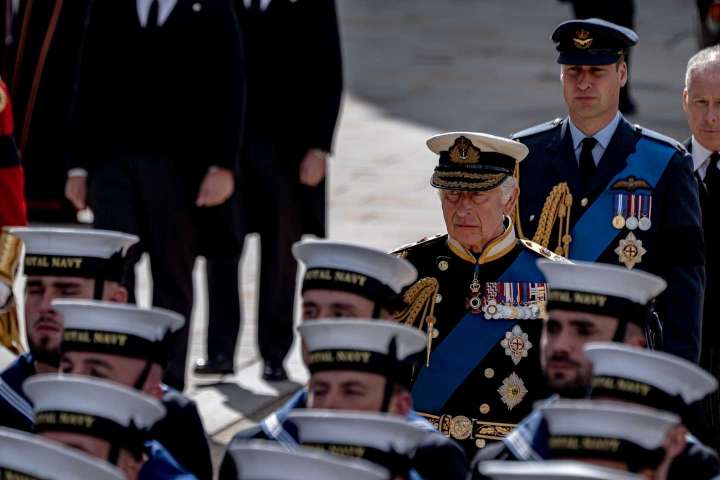Hereditary royalty is a conceit, a fairy-tale illusion. But people in a host of countries still see it as a useful organizing principle, at least for culture and communal ritual. The question now is whether, in Britain, the phrase “modern monarchy” turns out to be an oxymoron.
Can Charles III modernize the monarchy and still keep the magic?

But with the possible exception of Japan’s Emperor Naruhito — who modestly arrived at the abbey in one of the shuttle buses dignitaries were encouraged to take — none of those other royals is treated at home with anything close to the grandeur that was accorded to Elizabeth. And it is impossible to imagine any other monarch being given the kind of sendoff we just witnessed.
In part, that is because the Brits are simply better at this sort of spectacle and symbolism than anyone else, with the bearskin hats, the bright-red coats, the horses, the music and the unmatched, glittering crown jewels assembled from outposts of what was once the world’s biggest, richest empire.
In perhaps equal measure, though, the lavish funeral reflected Elizabeth’s ability to sustain a suspension of disbelief. She was able to update the monarchy in many ways — she was the first English monarch to consent to pay income taxes, for example, although she kept the royal family exempt from inheritance taxes. And the queen let the public glimpse the family’s domestic life in unprecedented — if highly controlled — ways, for better or worse. But she never gave a hint that she thought of herself as anything but a special human being, anointed by God to reign supreme over Britain and the Commonwealth.
Elizabeth was born into an age when it was possible to hold such a belief without question and without a hint of irony. For her, incredibly grandiose ceremony — like her funeral, which she had a big role in planning, down to the last detail — was more than a way to awe and delight her subjects. It was the proper order of things, indeed, a key function of the monarchy.
Follow Eugene Robinson‘s opinions
FollowKing Charles III comes to the throne in a very different era. Britain is a vibrant, fractious and multicultural society, and the British Empire is gone. He has to know that Britain’s elevated status in the world, relative to its population and might, is not divinely ordained — nor is it guaranteed. And he has already signaled that he will be a very different monarch.
Like British kings and queens before him, going back to Henry VIII, he is now the head of the Church of England, and at his coronation he will promise to be “Defender of the Faith.” But he has been more ecumenical than his mother in his approach to religion, pledging to defend Britain’s multiple faiths last week in a reception whose invitees included Christian, Jewish, Muslim, Buddhist and Sikh religious leaders.
Charles also reportedly feels a need to downsize the monarchy, perhaps to as few as seven working members. He is said to believe that the crown does not really need quite so many palaces and castles, and to have spoken of perhaps turning Balmoral, the private residence where Elizabeth died, into a public museum. And in his first week as king, he has shown a willingness to plunge into crowds and shake hands that must terrify his security detail. Once unpopular among the British public — mostly because of disapproval of the way he treated his first wife, Princess Diana, “the people’s princess” — it seems Charles might attempt to become “the people’s king.”
Victorian-era economist and essayist Walter Bagehot would very strongly disapprove. “Above all things our royalty is to be reverenced, and if you begin to poke about it you cannot reverence it,” he wrote. “We must not let in daylight upon magic.”
Elizabeth, in part because of her own belief system, managed to keep most of the magic hidden beneath all the thick layers of pomp and circumstance. I don’t see how Charles can avoid being much more exposed. That is what both the times and his own nature — at once introspective and confessional — appear to demand.
The question is whether a smaller, more modern, less grand, more open monarchy — which might be inevitable — can still captivate hundreds of millions of people in Britain and around the world.
For a millennium, rumors of the British crown’s demise have been greatly exaggerated. I wouldn’t bet that the monarchy will disappear anytime soon. But I do believe it might be on the road toward ever-so-slowly fading away.






